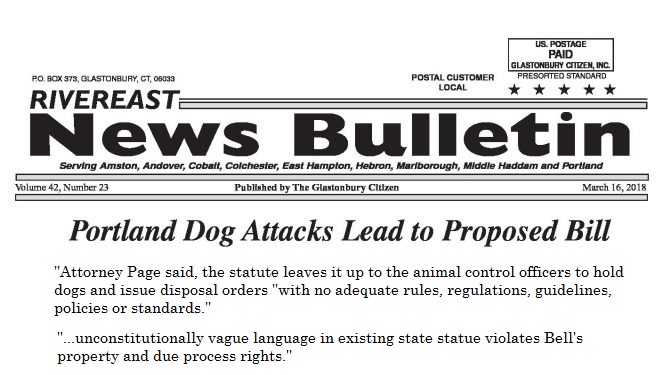Court overturns appeal, sentences Saint Bernard to death

Overworked Hartford Animal Control Cop Will Get More Help
December 7, 2017
THE TRUTH ABOUT THE LAW ON LEAVING DOGS OUTSIDE
January 11, 2018SOUTH HADLEY — A 3-year-old Saint Bernard named “Ziggy” has again been sentenced to death.
In a Nov. 28 ruling, Eastern Hampshire District Court Judge Matthew Shea said he “affirmed the request of the Town of South Hadley to humanely euthanize Ziggy.”
The ruling follows a dramatic back-and-forth between the town and the dog’s owner, April Marion, over whether Ziggy is legally a “dangerous dog” subject to the South Hadley Select Board’s euthanization order.
“I’m obviously completely devastated and heartbroken. To even think about killing my dog breaks my heart,” Marion said. “We’re definitely going to appeal it.”
“It’s a public safety issue,” South Hadley Town Administrator Mike Sullivan said. “What risk would the town be putting themselves in if they did not take all appropriate actions, and this animal hurt someone again?”
Shea’s ruling states that on May 19, Ziggy had attacked a dog on a walk with its owner and bitten 74-year-old Richard Todrin on the hand. The court also heard testimony from Todrin, who is now suing Marion.
The ruling also states that Ziggy had chased a cyclist and that when police intervened on the cyclist’s behalf, Ziggy charged the officer’s car.
The ruling included testimony from Dr. Timothy Galusha, the dog’s veterinarian, who said Ziggy “displayed unusually aggressive behavior” during his castration and treatment for a resulting infection. Galusha said that during visits to the vet, the dog growled and bared teeth. During one visit, “Ziggy, without warning, lunged and attempted to bite Dr. Galusha in the face.”
Shea wrote, “In Dr. Galusha’s opinion which I credit — Ziggy’s aggressive behavior and demeanor are not correctable.”
“It’s not something we wanted to do,” said Sullivan of the euthanasia order. “We wish that back in May 2016 there had been compliance, but there wasn’t and this is the result.”
The Nov. 15 trial that resulted in Shea’s ruling was a “de novo” review, meaning the ruling was made independent of prior decisions by the town and the courts.
The Nov. 28 decision reverses Clerk Magistrate William P. Nagle Jr.’s Oct. 10 ruling that granted Marion’s appeal and spared the dog’s life.
Nagle’s decision overturned an Aug. 8 order by the South Hadley Select Board to euthanize the dog, after multiple alleged incidents involving Marion’s two Saint Bernards between May 2016 and May 2017.
‘Multiple bites’
Prior to voting on euthanization, the Select Board met three times regarding incidents with Marion’s dogs. In May 2016 the board ordered her to keep the dogs contained, leashed and muzzled on walks, and buy a $100,000 insurance policy for dog bites.
“The order was the result of allegations received by the town of multiple bites by Ms. Marion’s dogs — which Ms. Marion denied,” Shea wrote in his decision.
Thompson Page, Marion’s attorney, argued that Marion had not been given proper notice of the May 2016 meeting, and that the allegations that led to the town’s restrictions on the dogs had no legal grounds, having not been submitted formally by a complainant.
At a July 11 meeting the Select Board determined Ziggy was a “dangerous dog” after hearing testimony from animal control officer McClair Mailhott about the incident involving Todrin. Page argued this broke protocol because Todrin himself had not filed a complaint, and that rendered the board’s decision invalid.
“If you don’t do the hearing properly, you can’t determine the dog is dangerous and they can’t order restrictions that you can then claim she violated,” Page said.
At the court hearing on Nov. 15, attorney Edward Ryan Jr., representing South Hadley, offered as evidence a disc containing video recordings of the three prior Select Board meetings discussing Ziggy’s behavior and ordering Marion’s sanctions. Page objected to this, arguing that prior testimony against the animal was “hearsay” and that the evidence should be stricken from the de novo review.
“I’ll be appealing because the judge let in evidence that was inadmissible,” Page said of the latest ruling. “He not only let it in, he memorialized it by using it in his opinion.”
Page, a frequent defender of people accused in “dangerous dog” cases, says current laws are antiquated, allowing for ambiguities and lapses in protocol that can mean life or death for a dog.
“This is not Moscow,” Page said. “Last time I checked this is the United States of America. We have laws and we follow them.”
Following the Todrin incident in May of this year, Marion euthanized Ziggy’s mother, Tiara, allegedly at the request of the town’s public health director, Sharon Hart. Marion said Hart had ordered her to put down both dogs that day by 4 p.m., but Marion could only afford to put down one and put down Tiara, believing her to be the aggressor.
“It’s bad enough I lost Tiara,” Marion said. “She was a female dog I used to breed — it was an income for me.”
Marion said she has spent approximately $2,500 on legal fees so far and is fundraising to continue Ziggy’s defense.
“They don’t want to kill Ziggy because he’s aggressive,” Marion said in a YouTube video posted on Nov. 30. “They want to kill Ziggy because they made bogus rules and I did not follow them.”
In his 17 years of working in local government, Sullivan said he has been part of four dangerous dog cases, half of them having to do with Marion’s dogs. He said the town has spent approximately $6,000 on the legal proceedings involving Marion’s dogs and lost productivity.
“I don’t want my children to have memories of their dog being killed,” Marion said in a separate interview. “I just want to get him out of here. If I have to move I will move.”



